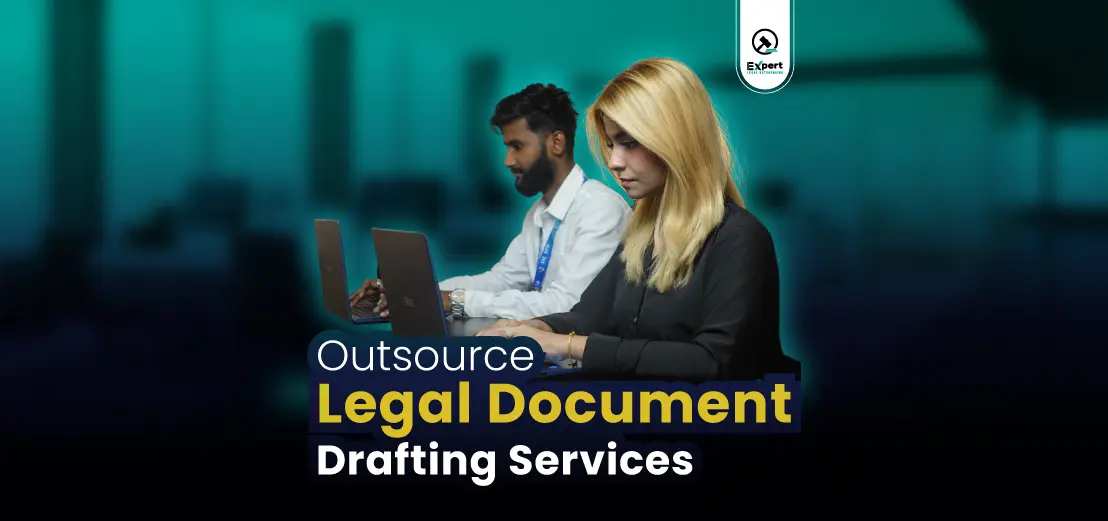Traditionally, large law firms or local solicitors haven’t prioritized drafting work, and when they do, the fees can be exorbitant. This leaves many companies seeking more budget-friendly alternatives such as outsourcing.
Outsourcing legal document drafting services has become a strategic decision for many businesses that regularly need precise legal documents, from employment contracts to leases and sales agreements.
Why?
Well, the benefits are evident: saves time, errors minimized, and costs significantly reduced. Lets expand on outsourcing legal drafting services, its benefits, and how to choose the right one.
Understanding Legal Document Drafting
“Legal document drafting involves careful and meticulous consideration of precise technical and legal language and structures to reflect the intentions of the contracting parties accurately.”
Basically, outsourcing legal drafting is an exhaustive procedure that demands paying close attention to details to generate error-free, immaculate documents. The legal document drafting procedure takes care of editing, proofreading, copy editing documents reviewing for errors in pre-drafted documents, and then re-drafting them as needed.
The Importance of Accurate Legal Documents
Here is why accuracy is important in Legal document drafting.

When two parties come to an agreement and put it into writing, the importance of precision cannot be overstated. Legal documents are binding and often scrutinized in court thus every word matters.
Documentation is vital for businesses all over the world as they are the foundation when partnerships are formed as well as the end when deals are closed off.
Even a seemingly small error can lead to significant disputes, potentially causing severe financial or reputational damage. It may sound silly but in some cases, a small error can cost an entrepreneur his company.
How the Judge Interprets Contracts
Courts interpret contracts based on exactly what is written, relying strictly on the language used. This is why documents need to clearly drafted, as courts are unlikely to consider intentions beyond whats written.
Services Under Legal Drafting in Outsourcing Companies
Outsourcing legal document drafting allows you to select specific services tailored to your needs. Here are some specialized services provided by Legal Process Outsourcing (LPO) companies:
- Legal Proofreading and Editing
Ensuring documents are error-free, accurate, and compliant with relevant laws. - Contract Drafting Services
Creating clear, enforceable contracts customized for various professional and commercial requirements. - Litigation Document Management
Organizing and managing case documents for easy and efficient access. - Legal Document Review Services
Examining documents to identify and correct inconsistencies or errors. - Drafting Complaints, Motions, and Terms
Crafting precise legal complaints, motions, and terms and conditions. - Discovery Document Drafting
Preparing and reviewing discovery documents to support the litigation process. - Trial Brief Writing Services
Composing comprehensive trial briefs that outline key arguments and case information. - Statutory Compliance Services
Conducting audits and offering advisory services to ensure regulatory compliance. - Corporate Compliance Services
Supporting corporate governance and regulatory adherence for businesses. - Legal Coding and Document Indexing
Providing organized and efficient electronic document management solutions.
By leveraging the expertise of specialized professionals, legal process outsourcing companies provide tailored solutions that empower your business to operate confidently and effectively.
However, just like every corporation has its challenges, they also accommodate various benefits.
The Challenges of In-House Legal Document Drafting
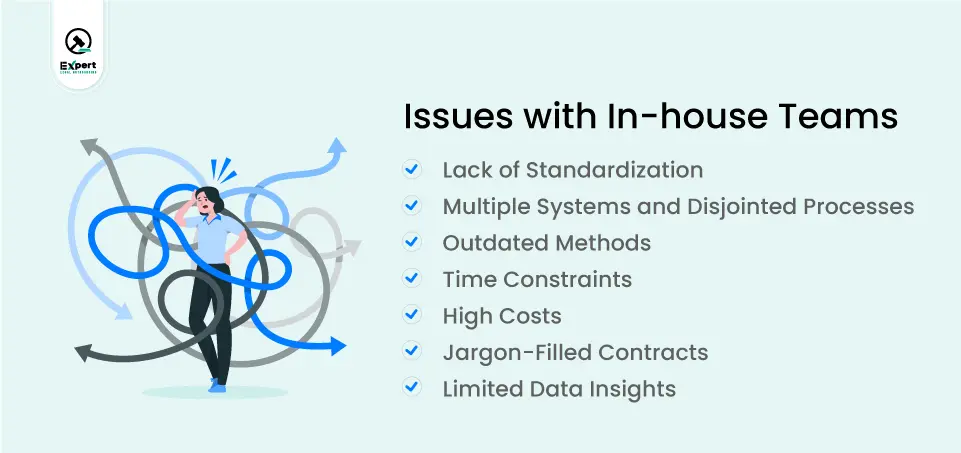
Traditional in-house legal teams face numerous challenges, many of which are common across the globe. Among these, the most significant obstacles include time constraints, high costs, and limited expertise.
However, by embracing outsourcing, businesses can effectively address these challenges while reaping substantial benefits from this strategic shift.
Lack of Standardization
Picture this: before your company has a dedicated legal team, contracts are a free-for-all. People copy old versions of NDAs or order forms, tweak them here and there, and save them wherever they please—personal desktops, email attachments, you name it.
Fast forward to today, and your sole in-house lawyer is trying to sort through a maze of mismatched contracts, all with slightly different terms. It’s messy, risky, and, frankly, a little embarrassing when outdated terms sneak into deals.
Standardized templates and automation would be a game changer, but until then, the chaos continues.
Multiple Systems and Disjointed Processes
If you’ve ever been trapped in the never-ending cycle of emails, redlines, and PDF edits, you know the struggle.
Draft in Word, negotiate over email, sign with a PDF tool, and then save it… somewhere. It’s clunky, inefficient, and hard to keep track of. Plus, when you’re hopping between so many tools, it’s easy to lose sight of where things stand.
A streamlined system would make life so much easier, but for now, it’s a daily juggling act.
Outdated Methods: Printing, Signing, Scanning
Nothing kills momentum faster than having to print, sign, scan, and email a contract. It’s slow, frustrating, and totally unnecessary in today’s digital world. Yet, many teams are still stuck in this old-school routine, and deals get delayed because of it.
eSignature platforms could speed things up dramatically, but they’re often overlooked, keeping the outdated process alive.
Time Constraints
Drafting legal documents in-house often demands substantial time and attention to detail.
Legal teams are frequently tasked with multiple, high-priority assignments, making it challenging to allocate enough time for comprehensive document review and drafting. This can lead to rushed work, increased risk of errors, and reduced efficiency in handling other crucial legal matters.
In a fast-paced business environment, time constraints can significantly impact a firm’s ability to respond quickly and effectively to legal requirements.
High Costs
Maintaining an in-house legal team dedicated to document drafting can be expensive.
Costs include salaries, benefits, ongoing training, and the necessary technology and software. For smaller firms or businesses operating on a tight budget, these expenses can become overwhelming.
Additionally, high employee turnover and the constant need for specialized training add to the financial burden, making it challenging for companies to maintain cost-effective legal support.
Complex, Jargon-Filled Contracts (“By Lawyers, for Lawyers”)
We’ve all seen contracts that read like they were written in another language. Legalese is tough for non-lawyers to navigate, but it’s everywhere.
The problem? The people who need to review and sign these documents—like business partners or new hires—often aren’t lawyers.
Simplifying contracts by cutting the jargon and highlighting key points could make things so much easier and faster. But in-house teams rarely have the time to make these much-needed updates.
Limited Data Insights
When contracts are tucked away in random folders or exist only as PDFs, it’s nearly impossible to get useful data. You miss out on valuable insights into where contracts get delayed or struggle to track renewal dates. And that’s when costly mistakes happen, like auto-renewing a service you no longer need.
Manually tracking contract details is an option, but it eats up time that your legal team should spend on higher-value work. A tech solution could solve this, but most in-house teams just don’t have the resources.
The Benefits of Outsourcing Legal Document Drafting
After covering the challenges of traditional legal drafting, lets talk about the benefits of outsourcing legal services.
Cost-Effectiveness
Let’s face it—keeping a full in-house legal team can get pricey. With salaries, benefits, ongoing training, and all the tech they need, the costs add up fast. Outsourcing lets you pay only for what you need, when you need it, helping you manage your budget better.
It’s a smart way for businesses, especially smaller ones, to save money while still getting access to top-notch legal experts.
Time Efficiency
Time is money, and outsourcing helps you save plenty of both. When you have external professionals drafting your documents, your in-house team is free to focus on the really important stuff.
Plus, these legal pros are used to handling high volumes of work quickly and efficiently, so you can rest easy knowing deadlines will be met, and everything will be handled smoothly.
Access to Specialized Expertise
Outsourcing gives you a direct line to specialists who know their stuff. Whether it’s tricky contracts or detailed regulatory documents, you get experts who handle this kind of work every day.
Instead of trying to figure it all out in-house, you get instant access to people who can draft exactly what you need with confidence and precision.
Improved Quality and Accuracy Challenges
Quality matters, and outsourcing ensures your documents are done right the first time. These legal drafting pros have rigorous review processes to catch any mistakes and keep everything in line with current laws and standards.
That way, you minimize the risk of legal hiccups and can feel secure knowing your documents are rock solid.
How to Choose the Right Legal Document Drafting Service Provider

In outsourcing, you also have the stress of which Legal process outsourcing company to choose for your tasks. Here is a guide on how to choose the right service provider for your law firm.
1. Evaluate Expertise and Experience
Assess the service provider’s experience in drafting various types of legal documents, such as contracts, wills, and business agreements.
A team well-versed in diverse legal domains can better understand and meet your specific needs. Ask for details about the legal qualifications of their experts and examples of their past work.
2. Review Technology Integration
Modern legal drafting services often use AI and automation tools to streamline processes and reduce costs. However, ensure that experienced legal professionals review the AI-generated drafts for accuracy and compliance.
Advanced platforms should also offer features like automated updates in line with new legal standards.
3. Ensure Compliance and Accuracy
Compliance with legal regulations is non-negotiable. The service should have mechanisms to keep up with ever-evolving laws and ensure documents are error-free.
Look for providers that offer detailed compliance checks, including revision tracking to monitor and maintain document integrity.
4. Request Case Studies or Sample Work
To verify the service quality, ask for case studies or examples of similar projects they have handled.
Reviewing their previous work can give you a clear sense of their drafting precision, adherence to legal norms, and problem-solving capabilities.
5. Consider a Trial or Test Project
Before committing, consider requesting a trial or a sample project. This trial run can provide a practical understanding of the service’s turnaround time, quality, and overall reliability.
Providers who offer flexibility in trial options often demonstrate confidence in their expertise.
6. Examine Data Security and Confidentiality
Legal documents contain sensitive information. The provider must use robust security measures, such as encryption and secure data storage, and comply with privacy laws like GDPR or CCPA.
Make sure to assess their confidentiality policies and data protection protocols thoroughly.
7. Evaluate Communication and Service Culture
Consistent and clear communication is vital for effective collaboration.
Opt for providers who offer regular updates and use preferred communication channels efficiently. A client-centric service culture that values feedback and offers tailored solutions enhances the overall experience.
8. Compare Pricing Models and Value
Analyze the pricing structure—whether it’s project-based, hourly, or a fixed monthly fee—and ensure it fits your budget without sacrificing quality.
Transparent pricing with no hidden fees is a hallmark of a trustworthy provider. You should weigh the costs against the potential value, such as reduced in-house expenses and access to specialized expertise.
9. Check Client Testimonials and Track Record
You must look up their outsourced legal research reviews and testimonials to get an idea of the provider’s reputation.
A history of successful partnerships and positive feedback from similar clients indicates reliability. Reach out to references if possible to understand their experience working with the service provider.
The Outsourcing Process: A Step-by-Step Guide
Outsourcing tasks, particularly in legal and business functions, can enhance efficiency, reduce costs, and provide access to specialized expertise. To maximize the benefits, it’s essential to follow a structured process. Here is a detailed guide to help you navigate the Outsourcing Process.
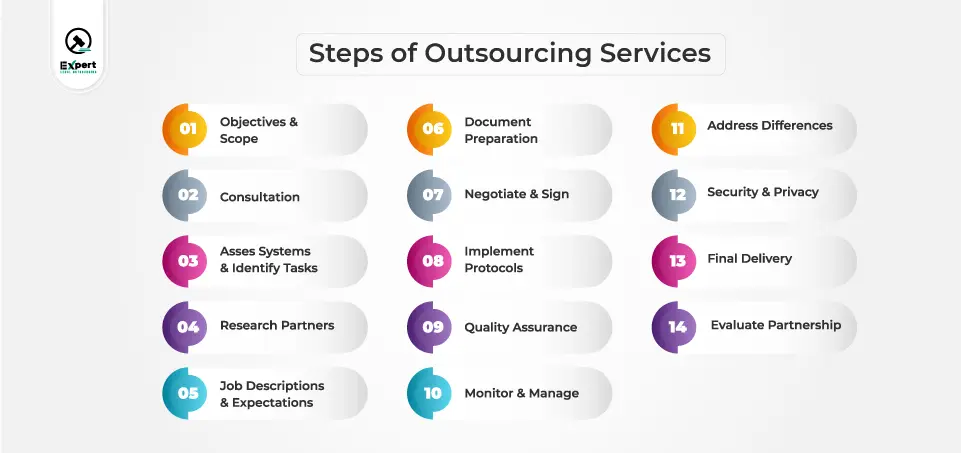
- Set Clear Objectives and Define the Scope
Establish specific goals for outsourcing—whether it’s cost savings, efficiency improvements, or specialized knowledge.
Define the scope by outlining tasks, deadlines, and expectations to ensure alignment between your firm and the outsourcing provider.
- Initial Consultation
Engage in a consultation with potential partners to discuss your needs. This is an opportunity to gauge their understanding of your business, clarify requirements, and assess how well they can deliver.
A strong initial consultation lays the groundwork for a successful partnership.
- Assess Current Systems and Identify Tasks for Outsourcing
Examine your existing processes to pinpoint tasks that could benefit from outsourcing. Identify areas where external expertise or more efficient execution would add value, such as legal document drafting or customer support.
- Research and Vet Potential Partners
Conduct thorough research on potential outsourcing providers. Evaluate their reputation, track record, and client feedback.
Request case studies or references to ensure their expertise aligns with your needs.
- Craft Clear Job Descriptions and Expectations
Once you’ve selected a provider, draft detailed job descriptions that outline deliverables, deadlines, and quality standards. Clearly communicated expectations reduce misunderstandings and ensure smooth project execution.
- Document Preparation
The provider begins working on the defined tasks or documents. You need to ensure all necessary information is accessible, and the outsourcing partner understands the details of your requirements.
This is when the actual work is carried out.
- Negotiate Terms and Sign a Contract
Before proceeding, negotiate the terms of the partnership. Finalize the scope of work, payment structures, confidentiality agreements, and timelines.
A well-drafted contract ensures legal protection for both parties.
- Implement Management and Communication Protocols
Set up communication channels and protocols, determining how often you’ll communicate, preferred tools (email, video calls, project management software), and primary contacts.
Consistent communication keeps the project on track.
- Quality Assurance
Implement quality control checks at various stages of the project to ensure it meets your standards.
The outsourcing provider should have a robust quality assurance process. You should also review work regularly to ensure it aligns with your expectations.
- Monitor and Manage the Project
Track the progress of the project to ensure it stays on schedule and meets quality standards. Utilize project management tools to monitor updates, address issues, and keep everything on course.
- Address Cultural and Geographic Differences
If outsourcing internationally, be aware of potential cultural or geographic differences that could affect communication and expectations.
Address these upfront to create a collaborative environment and avoid misunderstandings.
- Enhance Security and Privacy Policies
Ensure the provider adheres to strict security protocols to protect sensitive data. Review their privacy policies for compliance with regulations such as GDPR or CCPA, and use secure channels for communication and file sharing.
- Final Delivery
Upon completion, confirm that all deliverables meet your expectations.
Review the final work thoroughly, provide any necessary feedback, and once satisfied, proceed with payment and close the project.
- Evaluate the Partnership
Once the project ends, evaluate the success of the partnership. Assess communication, quality, and whether the objectives were met.
This feedback will be valuable for future outsourcing decisions and refining your processes.
Common Types of Legal Documents Outsourced
After we have provided you with a step-by-step guide on how to go about outsourcing, lets touch down on the 5 most common types of legal documents services that are outsourced globally.
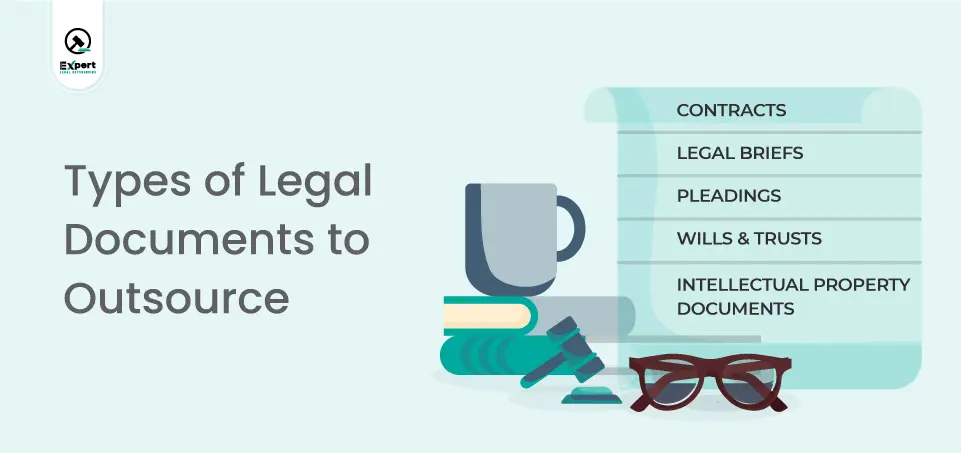
Contracts
Writing contracts involves using complicated legal language to make sure everything is clear and fair for everyone involved.
Mistakes or unclear wording can cause big problems down the road, which is why having experts handle them is important. With outsourcing, you can save time and avoid costly errors. It’s especially helpful for businesses that have to deal with lots of contracts.
Legal Briefs
A strong legal brief can make a huge difference in court, as it needs to present arguments in a clear and convincing way.
Writing these briefs takes skill and can be very time-consuming, especially since they have to follow strict rules for formatting and citations. By outsourcing this work, you can make sure your arguments are solid and all the details are correct, saving your team valuable time.
Pleadings
Pleadings are important documents that lay out the basics of a legal case. Filing them on time and getting everything right is crucial to avoid delays or mistakes that could hurt your case.
Each court has its own rules, which can be confusing to keep up with. Outsourcing pleadings to experts ensures everything is done properly and follows the rules, so your case can move forward smoothly.
Wills and Trusts
Creating wills and trusts is about more than just legal details—it’s also about making sure your loved ones are taken care of according to your wishes.
Outsourcing this work can make the process easier and give you peace of mind. Experts can help keep these documents up-to-date, especially as laws and tax rules change, so your family is well protected.
Intellectual Property Documents
Protecting things like your brand, inventions, or creative work is crucial for your business. Drafting documents for patents, trademarks, or copyrights has to be done carefully, as even small errors can weaken your rights. Get these documents outsourced and stay assured that your ideas are fully protected and that everything is handled correctly the first time with the help of experts.
Benefits of Outsourcing Legal Document Drafting for Specific Industries
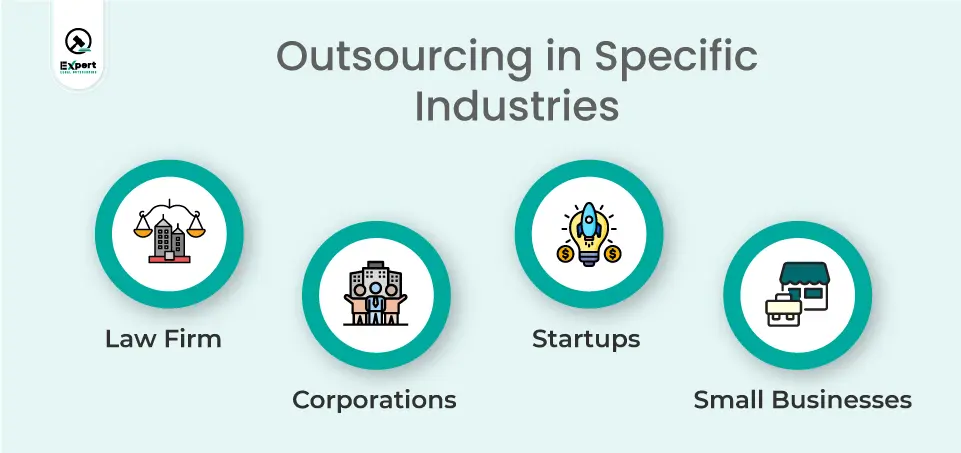
Law Firms
Law firms often handle a high volume of complex and time-sensitive legal documents. By outsourcing legal document drafting, firms can reduce the burden on their in-house staff, allowing them to focus on client-facing work and case strategy.
Outsourcing also offers access to specialized legal writers with expertise in different practice areas, ensuring documents are accurate, well-researched, and comply with legal standards. This helps improve efficiency and can also lower overall costs, especially for routine or high-volume drafting tasks.
Furthermore, LPOs are actively utilizing softwares to enhance their productivity such as Legal Document Automation Software.
Corporations
For corporations, outsourcing legal document drafting is a cost-effective way to manage the numerous contracts, compliance documents, and other legal paperwork required for operations.
By partnering with an external team, corporations can scale their legal support as needed without the expense of hiring additional in-house counsel. This flexibility is especially useful for handling projects like mergers, acquisitions, or regulatory changes.
Moreover, outsourcing ensures that documents are drafted efficiently and reviewed by experts who understand corporate law.
Startups
Startups often operate with tight budgets and limited legal resources, making outsourcing a smart move for handling essential legal documents like partnership agreements, intellectual property filings, or employment contracts.
Access to experienced legal professionals helps startups avoid costly mistakes and legal complications down the road.
In addition, outsourcing comes with the flexibility to scale. Thus, startups can scale their legal needs as they grow, ensuring that they have the right support without overspending on in-house legal staff.
Small Businesses
Small businesses benefit from outsourcing legal document drafting because it allows them to get professional-quality documents without the expense of hiring a full-time lawyer. Whether it’s contracts, non-disclosure agreements, or lease agreements, small businesses can ensure their paperwork is legally sound and protects their interests.
With Outsourcing, firms and business are able to free up time to focus on growing their corporation rather than getting bogged down by legal paperwork. Plus, having access to legal experts can give small businesses peace of mind, knowing they are covered from a legal standpoint.
Last Thoughts
Outsourcing legal document drafting has clearly emerged as a game-changer for law firms, corporations, startups, and small businesses alike.
By partnering with experienced Legal Process Outsourcing (LPO) companies, organizations can overcome common challenges such as high costs, time constraints, and more. This strategic move not only ensures the delivery of accurate, high-quality legal documents but also provides the flexibility to adapt to changing business needs.
Ultimately, outsourcing isn’t just about cost savings—it’s about positioning your organization for long-term success, freeing up resources, and focusing on what truly matters: your core operations and growth.
As you consider this option, remember to carefully evaluate potential providers based on their expertise, technology, compliance measures, and proven track record.
If you’re ready to streamline your legal operations and leverage the benefits of outsourcing, now is the perfect time to explore your options.
The future of legal services is here—efficient, cost-effective, and tailored to meet the demands of modern businesses. Why not take the first step toward transforming your legal document drafting process today?

Rafia Alam Rowshni delivers a unique combination of legal knowledge and content creation talent using SEO Tools and SERP analysis. She has a solid background in public health and legal services and knows the complexities of the legal world. She can translate complex subjects into simple, concise, and entertaining information that audiences can actually use.

